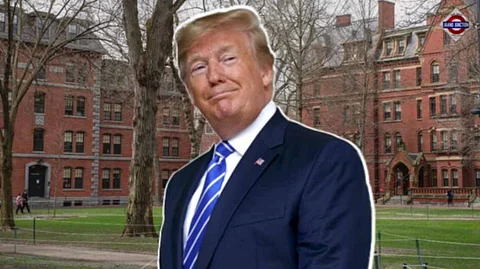

The Trump administration took action against Harvard University by revoking its ability to enroll new international students, freezing over $2.2 billion in federal funding, and threatening its tax-exempt status. These steps were taken over concerns about antisemitism and ideological bias.
Why has Trump stopped the Harvard University to enroll foreign students?
The United States Department of Homeland Security (DHS) has revoked Harvard University’s ability to enroll new international students under the Student and Exchange Visitor Program (SEVP), affecting thousands of foreign students—including nearly 788 Indians.
Student journalists Samuel A. Church, Cam N. Srivastava, and Grace E. Yoon reported in The Harvard Crimson that international students currently enrolled at Harvard may be forced to transfer to other institutions or risk losing their legal status to stay in the United States.
How will this affect the Indian Students studying in Harvard University?
As thousands of Indian and international students stare at an uncertain future after Harvard University was stripped of its ability to enroll students from foreign country. With its Student and Exchange Visitor Program (SEVP) certification revoked, Harvard can no longer admit foreign students on F-1 or J-1 visas. This has put the careers of around 6,800 international students - a quarter of Harvard's enrollment - in limbo. Among them, around 800 students are from India.
Students who have fulfilled their degree requirements this semester remain eligible to graduate. “There shouldn’t be an issue if students have met all graduation requirements—they should still be able to graduate,” said Nicole Hallett, a professor of immigration law at the University of Chicago Law School. However, those who haven’t yet graduated may need to transfer to another institution to maintain their visa status.
What charges are put against Harvard University?
On May 23, 2025, U.S. Homeland Security Secretary Kristi Noem announced that Harvard University’s certification under the Student and Exchange Visitor Program (SEVP) has been revoked, effectively halting its ability to enroll international students. The move affects nearly 6,800 international students, many on the cusp of graduation.
The administration accuses Harvard of enabling violence, promoting antisemitism, and maintaining ties with the Chinese Communist Party, while also defying federal directives on governance, admissions, and student data sharing. Secretary Noem underscored that hosting international students is a privilege—not a right—and warned other institutions to fall in line with federal standards.
Federal Jugde blocks Trump from revoking International Students
On May 22, 2025, a federal judge blocked the Trump administration’s broad effort to detain and deport international students, preventing the government from arresting these students or revoking their visas while the case proceeds in court.
Judge Jeffrey S. White of the Northern District of California, appointed by President George W. Bush, issued a temporary injunction protecting thousands of international students whose visas were revoked earlier this year without clear justification. He criticized government officials for causing widespread disruption and likely exceeding their authority with the mass visa revocations.
In his 21-page order, Judge White explained that the injunction provides students with stability and certainty, allowing them to continue their studies or employment without the constant threat of termination.
The ruling applies to all individuals similarly enrolled in the Student and Exchange Visitor Program (SEVP), which regulates student visas. Judge White also expressed concern that the administration was attempting to place future visa terminations beyond judicial review.
“At every stage of this and related litigation nationwide,” Judge White wrote, “defendants have repeatedly changed tactics to satisfy courts’ concerns. This pattern will likely continue unless they are enjoined from bypassing their own mandatory regulations.”
New York Times
